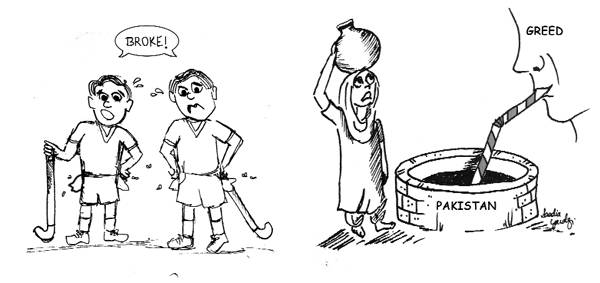
Not our war – I
Sir,
As the turbulence in Yemen goes on, the most apposite question is, where is the Organization of Islamic Countries?
Years of internal crisis has almost ruined Yemen beyond repair. With the conflict intensifying, it looks like there is no immediate end to terrorism, which has become a virus, infected deep and spreading rapidly in the region and beyond.
All the recent conflicts in the region are pointing to the fact that the world is still not fully equipped to deal with the increasing threat of terrorist activities. The damages reported in countries like Afghanistan and Iraq have already proved that they are not even close to restoring the peace they once had, and therefore the suffering of ordinary people, especially women and children, will continue.
It is high time world powers sat down together and take decisive steps to end decades of suffering of the ordinary people in the region, and to preserve priceless cultural heritage and millions of dollars worth of resources.
Shahid Ahmed Qureshi,
Badin.
Not our war – II
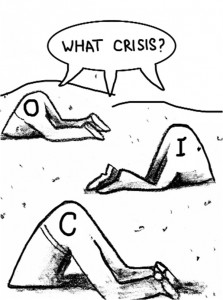
Sir,
The situation in Yemen is getting intense and so is the debate inside Pakistan on its likely role in the crisis.
The most depressing is the almost non-existent role of the United Nations. It is a classical example of the realism in international relations where nations conduct out of suspicion and mistrust on other states, Kingdom of Saudi Arabia is conducting herself on the notion or doctrine of preemptive strikes when it comes to the vital question of national security regardless of whether the principle of sovereignty is violated in the process. President George Bush invented the preemptive strike doctrine when the US attacked Afghanistan and Iraq in post 09/11 scenario.
Pakistan is clearly feeling the pull of the situation in Yemen. Pakistani state’s reliance and ideological closeness plus the ruling party leadership’s personal relations with the Saudi royal family has heavily tilted Pakistan in favour of Saudi Arabia in the unfolding conflict. There are far right elements in Pakistan who have enjoyed the support of Saudi Arabia and Pakistan in the last three decades, and are taking to streets in favour of Riyadh.
On the other hand, all centre left or left parties are warning the establishment and government not to repeat the mistakes of the past. Pakistan is a highly sensitive society. Pursuance of policies based on violence in foreign affairs in the last three decades has fractured Pakistani society on communal lines. The conflict in Yemen is clearly taking a communal shape, the impact of which would be disastrous for Pakistan. It seems that Pakistan is not responding to the situation as a nation but as sections of society with their own vested interests. A country like Pakistan which has, among other challenges, the problem of “identity crisis”, needs to take extra care in dealing with this situation.
Policymakers in Pakistan should also take the interests of overseas Pakistanis into account. There are around 10 million Pakistanis living abroad, whose contribution to the Pakistani economy is significant. In the present crisis in Yemen, if the situation escalates, it may impact the lives of many Pakistanis beyond Yemen. Taking sides in internal conflicts of other countries is always very tricky. We have already seen a bloody conflict in Syria where rival international players have been fighting each other through proxies for the last four years and there yet no end in sight. Let us hope that sense prevails and the conflict is resolved amicably.
Malik Atif Mahmood Majoka,
Melbourne.
Brilliant Bhutto
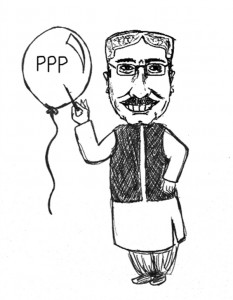
Sir,
I had just started going to the University of Engineering and Technology in Lahore when Zulfikar Ali Bhutto, the first Asian elected to the Berkeley Council and a graduate of Oxford and Lincoln’s Inn, arrived in Lahore amid a historic welcome after resigning as foreign minister.
He founded Pakistan People’s Party on 30th November 1967, at the residence of Mubashar Hassan on the Gulberg Main Boulevard. He mesmerized the youth, capturing their hearts and minds, awakened workers to their rights, and restored the honor and prestige of a nation devastated by a humiliating surrender at Dhaka.
Bhutto laid the foundations of our sole credible defense mechanism with his resolve to acquire nuclear deterrence for Pakistan, and brought together warring Muslim nations by holding the Islamic Summit at Lahore on 22nd February 1975. It was during his tenure that Pakistan got its unanimously adopted 1973 Constitution, a document that Quaid-e-Azam wanted to be drafted immediately after partition, so that foundations of a modern democratic welfare state could be achieved – an objective that unfortunately fell victim to the greed of vested powers.
Bhutto believed in a foreign policy of bilateral-ism, with an emphasis on national interests and a policy of non-interference in the affairs of other countries. He established Pakistan Steel Mills, the Heavy Mechanical Complex Taxilla, the Port Qasim Authority, and the Karachi Nuclear Power Plant. It was under his tenure that Pakistan International Airline was restored to profitability by appointing men of integrity and caliber like Rafique Saigol and Nur Khan. Under his tenure, employment opportunities increased and recruitment was strictly on merit. He laid emphasis on development of human resources by promoting and subsidizing education in sciences, economics and liberal arts, and provision of basic health to the poor and deprived.
It is unfortunate that the PPP of today has nothing in common with the philosophy, manifesto or ideology of Zulfikar Ali Bhutto. It has been reduced to a regional party, hostage to corruption, which has systematically indulged in the plunder of state institutions. Compromising with criminals has reduced Karachi to the status of the most dangerous city in Asia. While Asif Zardari makes palatial villas in Pakistan and abroad, Bhutto lives in the hearts of people.
Ali Malik,
Lahore.
Losing our minds
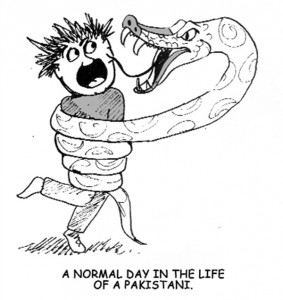
Sir,
We Pakistanis endure a lot of unpleasant things every day. Although we think we are used to them and they don’t seem to bother us, subconsciously we are being greatly affected. We witness crime, watch pain, read tension and hear agony. These things lead to depression, agitation, impatience, emotional disturbance and unrest in our personalities. Our performance at work is being affected too. In short, we are becoming unhealthy. We need to find a solution before these grave psychological problems break down our social and moral fiber completely.
Zahabia Khozema,
Karachi.
Hope
Sir,
For many years, the people of Karachi were living in fear. But for the first time in recent history, they have felt a glimmer of hope. It seems that the government is taking stern action against terrorism in Karachi.
Since the Rangers started a law-enforcement operation in the port city, there has been a marked decrease in crime. It is a good sign for Karachi and for Pakistan, because Karachi is the financial hub of the country.
M Shayan Abbasi,
Karachi.
Let sanity prevail
Sir,
Not only the world media but the Pakistan print and electronic media as well is replete with news on the escalating Yemeni conundrum. Yemen is in the grip of its most severe crisis in years, as competing forces fight for control of the country. Underprivileged but strategically significant, the fight for power in Yemen has serious implications for the region and the security of the West. It may be known to everyone who keep a close eye on the brisk political developments that are taking place in the Arab world that in recent months Yemen has gone down into disputes between a number of different groups, thus pushing the country “to the edge of civil war”, commented the UN’s special adviser.
It is a known fact that the main fight is between forces loyal to the beleaguered President, Abdrabbuh Mansour Hadi, and those allied to Zaidi Shia rebels known as Houthis, who forced Mr Hadi to flee the capital Sana’a in February this year. Yemen’s security forces have split loyalties, with some units backing Mr Hadi, and others the Houthis and Mr Hadi’s predecessor Ali Abdullah Saleh, who has remained politically powerful. Mr Hadi is also supported in the predominantly Sunni south of the country by militia known as Popular Resistance Committees and local tribesmen. After rebel forces closed in on the president’s southern stronghold of Aden in late March, a coalition led by Saudi Arabia responded to a request by Mr Hadi to intervene and launched air strikes on Houthi targets. The coalition consists of five Gulf Arab states and Jordan, Egypt, Morocco, Pakistan and Sudan.
What truly should be a matter of serious concern and must be clearly understood is that the current crisis in Yemen possesses every potential to innately aggravate regional tensions. The West also stands seriously perturbed by the rapidly worsening situation. Not only the Arab world but the entire world and the coalition partners including Pakistan, a very close friend of Saudi Arabia, must immediately put their heads together and sincerely attempt to find a diplomatic solution to the crisis.
M Fazal Elahi,
Islamabad.
A story of greed
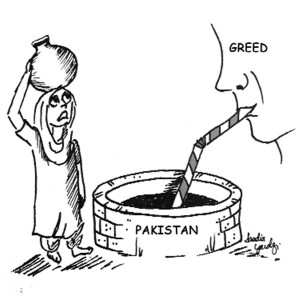
Sir,
As long as Pakistan’s destiny and fate of its people is hostage to the greed of a few, this country will continue to be entangled in proxy wars of others, its economy will suffer because of massive flight of capital, and the blood of its citizens will continue to be spilled on the streets of its cities and towns, because criminal economy yields political and financial dividends for those who sponsor it.
The political struggle of our founding fathers was waged so that we could become an independent sovereign state, where the constitution reigned supreme, and not to replace likes of Robert Clive and East India Company with brown natives who consider this country not secure enough for their families to reside, or their major assets to be located.
Pakistan was not created by our founding fathers to become a state where robbers and criminals reap a bonanza, occupy private, state and forest lands through threats and intimidation, destroy our green belts replacing them with concrete jungles, pay no taxes, raise private militias and transfer all their finances to foreign safe havens.
Malik Tariq,
Lahore.
Obstruction

Sir,
Pakistan Hockey Federation has wrapped up its national training camp in Islamabad, citing a lack of funds as the major reasons behind the closure. The PHF could not pay its players and coaches their daily allowances. Hockey India responded with a very good gesture, offering financial help to PHF.
Meanwhile, the president of the federation, Akhtar Rasool, has made an emotional appeal to Prime Minister Nawaz Sharif to save the national game. It remains to be seen if he, or the Pakistan Sports Board, will act.
Mubashir Mahmood,
Karachi.
Slippery slope
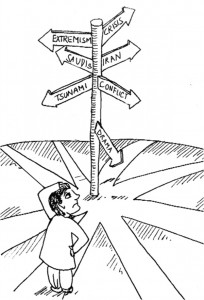
Sir,
Airstrikes by Saudi Arabia, in collaboration with nine other powers and under the blessings of America, are already underway bombarding the Yemeni Houthis, who have been labeled an Iranian proxy. While the arrival of troops in Yemen in a bid for land warfare is under consideration, Pakistan too is under pressure to decide whether to join in this powder keg or to stay clear of it. Decide Pakistan must, but that decision must be rational. Being intimidated by the financial stick of Saudi Arabia or carried away by its emotional carrot — the poignant urge of brotherhood and camaraderie — are the foibles Pakistani decision-makers are currently vulnerable to.
The Pakistani defense minister has tried to vaguely assure Pakistanis that he will not drag Pakistan into someone else’s war, allowing for the clear loophole that Pakistan must and will stand with Saudi Arabia in case of threat to its territorial integrity. But how does territorial threat to Saudi Arabia make it our war anymore than it does now? And if, as Yemeni rebels have threatened that they will carry out suicide bombing in Saudi Arabia, what service will Pakistan be of when it has itself been a victim of suicide bombings for more than a decade? Clearly, Pakistan will not do anyone any service, but it will do itself a great disservice by embroiling itself in this proxy war.
Some have tried to compare the Pakistani predicament with the one it had to face back in the 1980s. They are probably trying to highlight the dire consequences of Pakistani involvement in a foreign conflict and to this degree they are right, but choices and alternatives before Pakistan at this moment compared to the time before the Afghan Jihad. The pressures are way too weak. The conflict in Yemen has no strategic consequences for Pakistan as the two do not share a boundary. The diplomatic pressure on Pakistan is way too low, as Pakistan can clearly see that it has nothing to lose in the situation, except for Saudi dollars.
Speaking of dollars, the only leverage that the Saudis have over Pakistan right now is financial. And looking at the dollars that have flowed from Saudi pockets into Pakistani coffers, the leverage is not insignificant. Given the frailty of Pakistani economy — that mostly runs on aid and freebies — Saudis find this leverage large enough to strong-arm Pakistan. However, looking at the same situation from the perspective of when Pakistan would have involved itself in Yemen, the leverage seems unconvincing and petty. Even if, for a second, it is assumed that Saudi financial stick is too strong, does it sound logical to risk Pakistan-Iran relations for a war that Pakistan can avoid?
Another seemingly moderate point of view is that Pakistan must facilitate negotiations between the warring parties. As this stance does not determine what role will Pakistan have as a facilitator of the negotiations or whether Pakistan has the capacity to play such a role, it is also vague. It is misleading also because on the one side is the Houthi party, to which Pakistan can hardly relate, and on the other side lies the Saudi coalition, where Pakistan does not have any significance.
Taking even the least part in this conflict will put Pakistan on a slippery slope that leads to its perpetual involvement in the Middle East. Currently, Pakistan has only financial stakes in this imbroglio, which are resistible, but once Pakistan chooses to play any role in this conflict, its stakes will rise and, with time, it will grow only more difficult for Pakistan to stop its slide down the road.
Akhtar Nawaz,
Islamabad.

